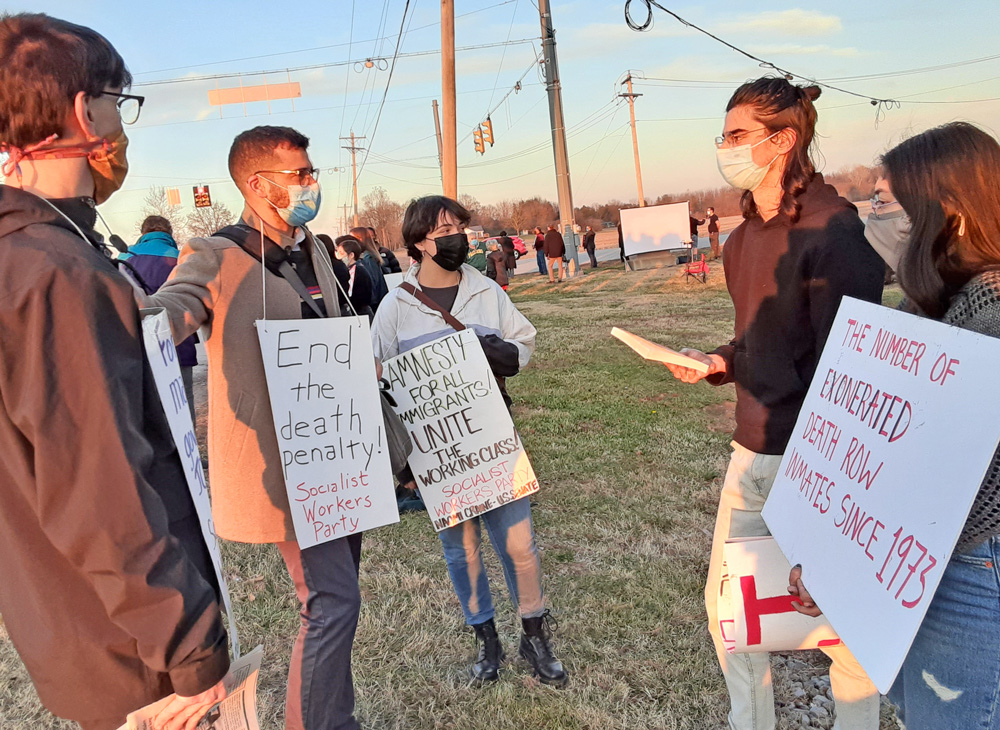TERRE HAUTE, Ind. — Rallying across the street from the federal prison here Dec. 10, 40 people protested the execution of Brandon Bernard before the U.S. government put him to death. The following day federal inmate Alfred Bourgeois was also executed, the 10th carried out since the Donald Trump administration resumed use of capital punishment in July after a 17-year hiatus.
Prisoners on death row “are human beings who are capable of many things, of changing,” retired Unitarian minister Bill Breeden told the rally, “but with this terrible threat hanging over them, often for decades.”
Bernard, an African American, was convicted for his role in the 1999 murder of two youth ministers, Todd and Stacie Bagley, in Texas when he was just 18 years old. He was the youngest person to be executed in nearly 70 years.
Prior to Bernard’s execution by lethal injection, over 500,000 people signed petitions urging President Trump to commute his sentence. This included a high-profile appeal from Kim Kardashian West asking the president to spare his life.
Five of the nine jurors who had sentenced Bernard to die, and Angela Moore, who in one of his appeals had been the prosecutor who defended the order to execute, said they had changed their minds, now calling for clemency. “Having seen Brandon grow into a humble, remorseful adult fully capable of living peacefully in prison,” Moore wrote in an op-ed in the Indianapolis Star Nov. 18, “how can we say he is among the tiny group of offenders who must be put to death?”
Despite all this, the U.S. Supreme Court denied a motion to stay his execution.
In sober remarks right before he was put to death, Bernard said, “I’m sorry. That’s the only words that I can say that completely capture how I feel now and how I felt that day.”
Demonstrators participating in the Dec. 10 vigil came from several cities in Indiana; Chicago and Winnetka, Illinois; Louisville, Kentucky; and Minneapolis.
Commenting on her experiences protesting capital punishment, Audria Hettinger, a student at Indiana University in Bloomington, told the Militant, “We partnered with Yvette Allen, sister of Billie Allen who is on death row in Terre Haute. Together we organized protests last weekend in Bloomington, Indianapolis and Terre Haute. Then seven students carpooled to the vigil here today against the killing of Brandon Bernard.” Indiana University student Brian Hancock added, “We are against all these executions. Some of us will stay to protest tomorrow against the scheduled execution of Alfred Bourgeois and we’ll be back protesting others.”
Samir Hazboun gave greetings to the rally from the Socialist Workers Party. “The administration has escalated these federal executions now, but the use of the death penalty is truly a bipartisan attack on the working class,” Hazboun said. “We are for abolishing the death penalty. We are against all these brutal federal executions and those done by state governments as well.”
The U.S. rulers use capital punishment to intimidate working people, by showing them the brutal tools they have — and will use — against workers who mount resistance to boss and government assaults.
Bourgeois, a former truck driver in Louisiana, was executed the next day. He had been convicted in 2002 of murdering his 2-year-old daughter. The Justice Department had scheduled his execution for last January but a federal court put a stay on this because of Bourgeois’ severe mental disabilities. Then the Supreme Court refused to delay the execution any further.
The U.S. government has scheduled execution for three more federal inmates next month — Jan. 12 for Lisa Montgomery, who would be the first woman on federal death row to be put to death in nearly 70 years; Jan. 14 for Cory Johnson; and Jan. 15 for Dustin Higgs.


